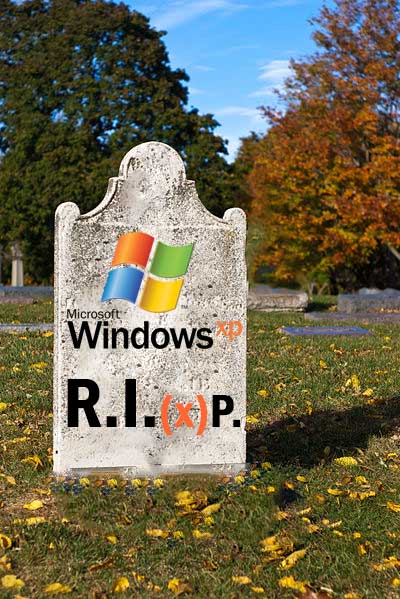Windows XP is Dead…
Windows XP is Dead... | Tech Tips Podcast by PcCG
Subscribe via Itunes | Subscribe via RSS
…Or at least that’s the buzz going around.
I have received several calls from clients asking what they need to replace their computer with, since Windows XP is “dead” as of April 8th, 2014. As a side note, Office 2003 support ceases the same day.
I have received several calls from clients asking what they need to replace their computer with, since Windows XP is “dead” as of April 8th, 2014. As a side note, Office 2003 support ceases the same day.
This, however, does not mean that all computers running Windows XP will stop running in April 2014. It doesn't mean you will lose data, nor will your computer burst into flames tomorrow.
Rather, on April 9, 2014, when you turn your computer on--it will function the same as it has in years before.
What Microsoft is saying is simply that they will not provide tech support for it, nor will they provide any future updates. The majority of us have never called Microsoft for support anyway, so if you are in that boat, then all it means is you won’t get updates anymore.
What does that mean?
Not receiving updates means if hackers find exploits in the XP system, they might be able to take advantage of those exploits. Of course, if you are one of my customers, you have Norton Internet Security protecting your computer anyways, so much (but not all) of that is blocked anyway.
It also means that as the years roll on, newer software will become less compatible with what you have now. It doesn’t mean things won’t work (for the most part), it simply means it might not work as it does for everyone else.
Ultimately, you will need a new computer if you plan on keeping up with the “modern age”. But if you plan on using the same 'ole software, then you can run your XP computer until it collapses from exhaustion.
So in short, April 9th will be just like April 8th, for those that are still running Windows XP. By 2015 or 2016, your software may become too obsolete to run many activities. Until then, there’s nothing to worry about… well other than your computer being slow and 10+ years old (a very senior citizen in computer years).
Ultimately, I tell my clients this: “It’s time to replace your computer when it doesn’t do what you want it to anymore.” There is no time-limit, there is no relevance to what everyone else is doing. The only thing that matters is: Does it serve your purpose, the way you want it to?
If you do decide you want to purchase a new computer (something I am not at all against), you might get use out of our new computer recommendations article.









